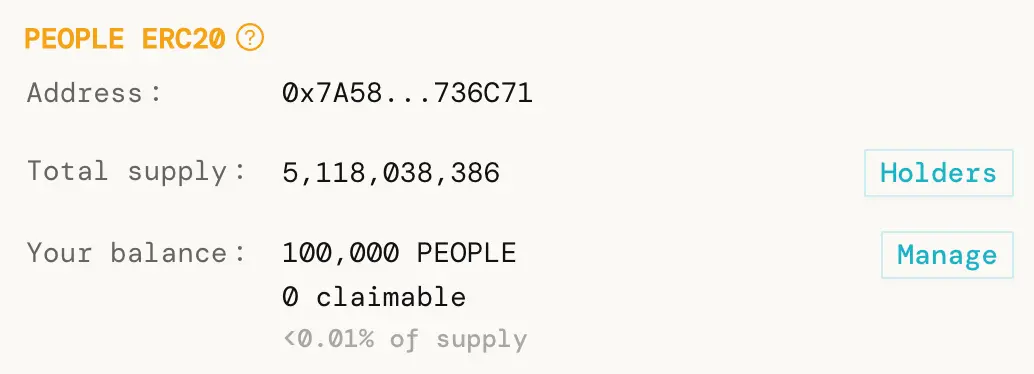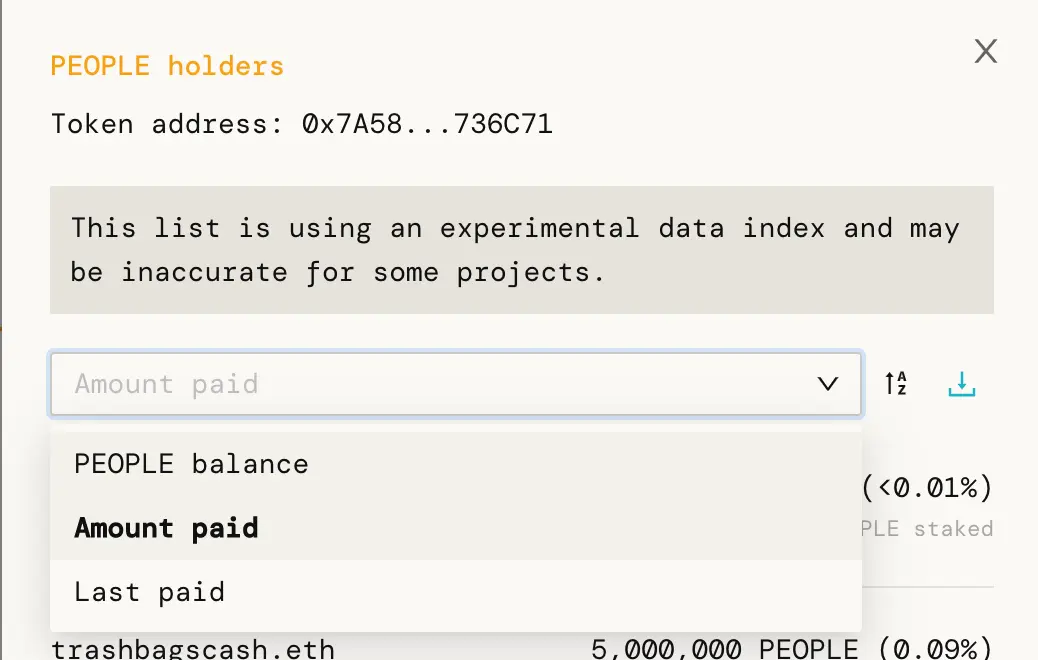Airdrop Guide: Rewarding Your Community
This is a mirror of y4000.eth's blog post.
It’s amazing when a community comes together in the world of web3. It’s a bit sad to see one fizzle out just as quickly as it forms.
Rewards play a key role in galvanizing a community further. As we’re figuring out these experiments with DAOs — I wanted to share the technicals of how I was able to whitelist 39,895 wallet addresses for an Ethereum mainnet smart contract while avoiding a cost prohibitive gas expense. This article dives into NodeJS, JavaScript, Merkle Trees, and Solidity.
The “DAO” in question is one that has partially fizzled out, ConstitutionDAO, the original team responsibly abandoned the project after the initial goal (to win an auction to acquire a historic copy of the Constitution) failed. They made sure everyone who donated could get a refund — and avoided ever looking like scammers, which was definitely a good move. PeopleDAO formed shortly after, organizing around the $People ERC-20 token (which contributors could opt to claim instead of their refund). The token is inherently a fairly distributed token and it is great to see a community evolve out of it.
I had come up with a generative art NFT Collection concept around the time the auction was lost — and I wanted to make it available for anyone who took part in the DAO. It was great to see so many new entrants into the world of web3 and I wanted to help keep them engaged. More about that can be found here.
To get to the nuts and bolts of it all the starting point was getting an export of all the contributor wallets.
JuiceBox — Get an Array of wallet addresses
If you’ve run your DAO fundraising via JuiceBox, as the ConstitutionDAO did, they make it pretty easy to export the wallet list as a CSV file:

Simply click on "Holders"
On the holders dialog you’ll be able to select “Amount paid”:

Clicking the little blue "download" icon on the right will get you a CSV
Once you’ve got the CSV, you will want to process that into a JavaScript Array list of wallet addresses. Here is a snip of NodeJS to generate the JSON:
const fs = require('fs'); const allFileContents = fs.readFileSync('../cdao_wallets.csv', 'utf-8'); let wallets = new Array(); allFileContents.split(/\r?\n/).forEach(line => { wallets.push(line.split(',')[0]); }); fs.writeFileSync('./wallets.json', JSON.stringify(wallets, null, 2) , 'utf-8');
Building a Merkle Tree
To get a basic understanding of what Merkle Trees are, I suggest starting with the Wikipedia entry.
Now that we have a list of wallets as a JavaScript Array we can process that array into a Merkle Tree and generate a rootHash — this is basically the “public key” for the tree, any proof can be validated with knowledge of the rootHash — once this is generated we use the value within our Solidity smart contract. We leverage two open source projects to achieve this: keccak256 and merkletreejs — here is a NodeJS code snip to generate the rootHash:
const wallets = require('./wallets.json');
const keccak256 = require('keccak256')
const { MerkleTree } = require('merkletreejs')
const leafNodes = wallets.map(addr => keccak256(addr))
const merkleTree = new MerkleTree(leafNodes, keccak256, {sortPairs: true})
const rootHash = merkleTree.getRoot()
console.log('rootHash', rootHash.toString('hex'))
Setting up a Webservice to Generate Merkle Proofs
To verify if a wallet is a contributor we will need to generate a proof for that wallet and send that proof into the smart contract function the wallet wishes to transact on. In the case of the CFRAC project, we’re allowing a contributor to mint an NFT for free…. On our mint website, the user is prompted to connect their wallet, once connected we verify if they are a contributing address, if so we generate the proof and allow them to run the daoMint function on our smart contract. Here a code snip of the simple webservice (built with expressjs) to generate the proof:
const wallets = require('./util/wallets.json');
const keccak256 = require('keccak256')
const { MerkleTree } = require('merkletreejs')
const leafNodes = wallets.map(addr => keccak256(addr))
const merkleTree = new MerkleTree(leafNodes, keccak256, { sortPairs: true })
app.get("/proof/:address", (req, res) => {
let addrs = req.params.address.toLowerCase();
let hexProof = merkleTree.getHexProof(keccak256(addrs))
// send json of res
res.json(hexProof);
});
The address is simply the hex wallet address the user connected with passed in by the mint website frontend code.
Finally, verify the Merkle Proof in the Smart Contract
Once the frontend code has the proof in hand, it is ready to be sent to the daoMint function on the smart contract. Luckily for us, OpenZeppeliln makes available a library that makes this task super easy. Here is a Solidity code snip of the smart contract:
import "@openzeppelin/contracts/utils/cryptography/MerkleProof.sol";
...
function daoMint(bytes32[] calldata _merkleProof) public whenNotPaused {
bytes32 leaf = keccak256(abi.encodePacked(msg.sender));
require(MerkleProof.verify(_merkleProof, MERKLE_ROOT, leaf), 'NOT_DAO_MEMBER');
_safeMint(msg.sender, _tokenIdCounter.current());
_tokenIdCounter.increment();
}
Note the MERKLE_ROOT is a constant variable with the value of the earlier generated rootHash. You can view our full smart contract on Etherscan: 0x0fB73942cdffd45ccC8517061ae7430cDdde6b50
Conclusion
Given the maturity of all the open source libraries available, this otherwise complex concept can be distilled into a simple and elegant implementation. Feel free to reach out to me on Twitter: twitter.com/Y_4_K — and be sure to check out the CFRAC NFT collection.